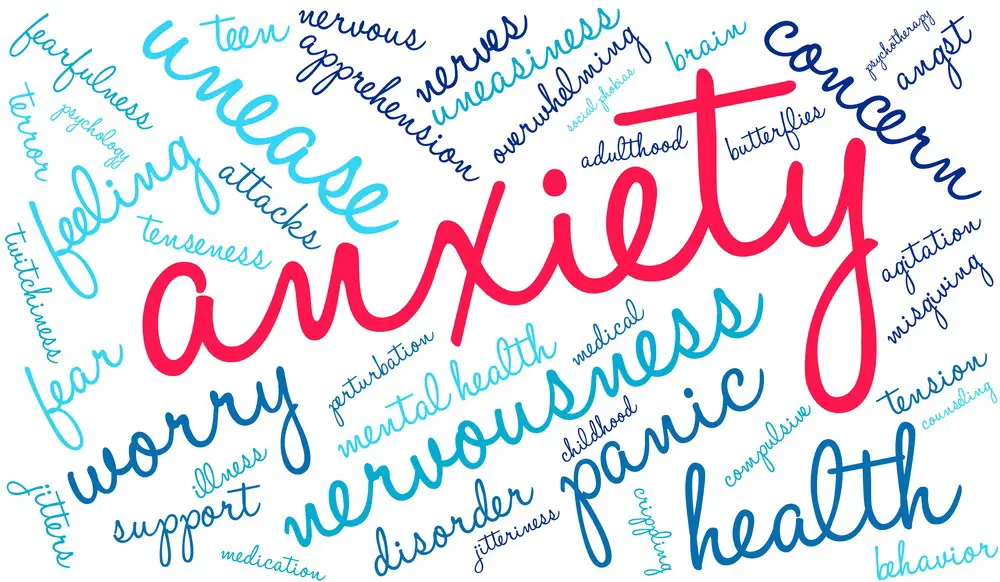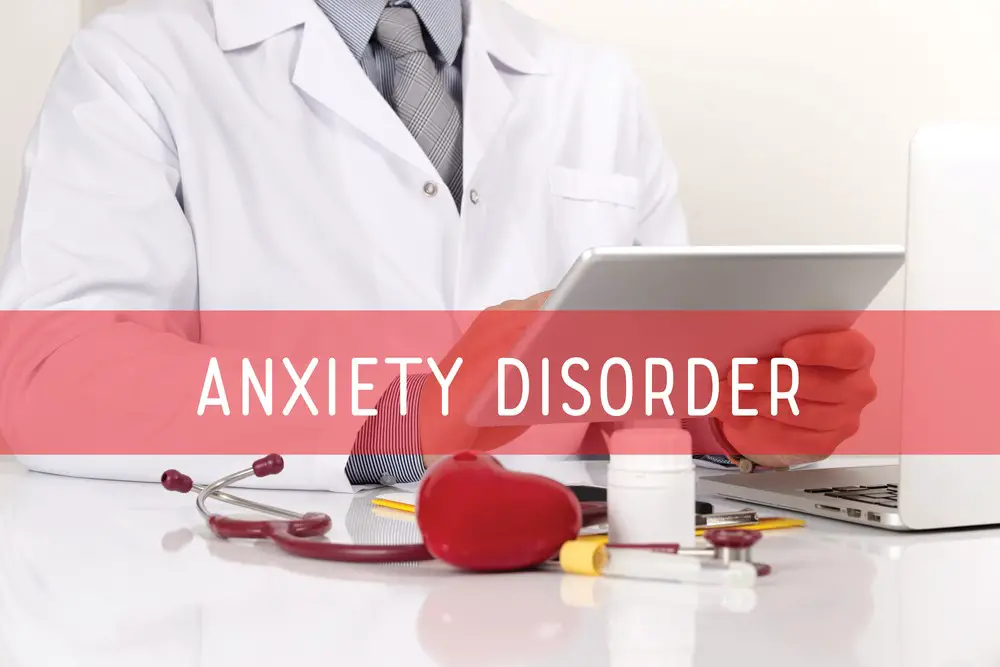As a BetterHelp affiliate, we receive compensation from BetterHelp if you purchase products or services through the links provided
Anxiety sore throat is a phenomenon where physical symptoms of a sore throat manifest in response to increased stress or anxiety levels. Individuals experiencing this condition may find it difficult to swallow, have a sensation of a lump in their throat, or even feel tightness around the neck. While this may cause additional anxiety due to health concerns, it’s important to understand that the root cause is anxiety, and treating the underlying emotional factors can alleviate the symptoms.
An anxiety-induced sore throat can often mimic the symptoms of a cold or flu, making it challenging to differentiate between the two. However, anxiety may be the culprit if the sore throat persists without any accompanying flu or cold symptoms or worsens during stressful situations. To accurately diagnose this condition, seeking a professional medical opinion is crucial. Consultation with a healthcare professional can help identify any potential triggers or causes of this anxiety-induced sore throat and guide in choosing suitable treatments.
Key Takeaways
- Anxiety sore throat is a physical symptom arising from stress, with a sensation of tightness or lump in the throat.
- It often mimics cold or flu symptoms but persists or worsens with stress, requiring a medical consultation for proper diagnosis.
- Addressing the root anxiety and identifying triggers is essential for choosing effective treatments and managing the condition.
 Understanding Anxiety and Sore Throat
Understanding Anxiety and Sore Throat
Anxiety is a common emotion that can manifest in psychological and physical symptoms. One such physical symptom is a sore throat or the sensation of a lump in the throat. This sensation is also known as Globus sensation and may be experienced by individuals with anxiety disorders.
Globus sensation, formerly Globus hystericus, is when a person feels discomfort or fullness in their throat, even when there is no physical obstruction. This feeling is often caused by nervousness or visceral anxiety, as the body reacts to emotional stressors by tensing the muscles around the throat.
Individuals experiencing anxiety may report the following symptoms related to a sore throat or globus sensation:
- Discomfort or pain in the throat
- Difficulty swallowing
- A persistent sensation of a lump in the throat
It is essential to understand that globus sensation does not typically indicate serious health issues; it is largely due to heightened emotions or anxiety. However, if the symptom persists or intensifies over time, consulting a healthcare professional is recommended to rule out any underlying medical conditions.
Managing the sensation of a sore throat or lump in the throat begins with addressing the root cause: anxiety. Various techniques and strategies can be applied to help reduce anxiety, such as:
- Practicing relaxation techniques, like deep breathing or mindfulness
- Engaging in regular physical activity to reduce stress
- Seeking professional help, like therapy or counseling, to address anxiety disorders
By alleviating anxiety and managing the emotional aspect of this condition, one can significantly reduce the discomfort or sensation of a sore throat or lump in the throat associated with anxiety.
Recognizing Symptoms
Anxiety sore throat can manifest in many ways due to muscle tension, dry throat, and adrenaline rushing through the body. Recognizing these symptoms is key to understanding and managing this condition.
Feeling tightness in the throat is one of the most common symptoms. This happens as muscles around the throat tense up when experiencing anxiety. It can cause difficulty breathing, swallowing and the sensation known as globus pharyngeus. The sensation of a lump in the throat can cause discomfort even though no actual obstruction is present.
Another common symptom is shallow breathing. This happens when anxiety triggers hyperventilation, leading to a change in breathing patterns. Shallow breathing can contribute to dry throat, hoarseness, and coughing. It can also exacerbate feelings of tightness, which may already be present due to muscle tension.
Throat irritation and soreness can be intensified by cortisol, the stress hormone. Cortisol weakened the immune system, leading to inflammation and increased susceptibility to infections, such as tonsillitis. The sore throat may also accompany body aches, headaches, and nausea. Sometimes, people with anxiety may experience an anxious cough, worsening the sore throat.
Moreover, while hyperventilation can cause a dry throat, so can other factors like postnasal drip and allergies. These can aggravate a sore throat, especially when accompanied by constant coughing. Some individuals may experience muscle tension dysphonia, a swallowing disorder (dysphagia), due to the muscle tension around the throat.
Lastly, it’s important to note that while anxiety can cause a sore throat, it’s essential to rule out other causes, such as infections or flu, before concluding that anxiety is the primary cause. Evaluating all relevant symptoms helps make a more informed diagnosis and ensures appropriate treatment and management.

Diagnosis and Medical Advice
When experiencing anxiety-related sore throats, it is essential to consult a doctor for proper diagnosis and medical advice. The healthcare professional will evaluate the symptoms, perform a physical examination, and may even recommend some tests to rule out other underlying conditions.
During the assessment, the doctor will check the throat muscles and larynx to determine if there are any visible signs of inflammation or irritation. Additional tests like blood work or throat swabs may be required to confirm the diagnosis. Once a thorough evaluation occurs, the healthcare provider can determine if the sore throat results from anxiety or another medical condition.
Following the diagnosis, the doctor will offer appropriate medical advice tailored to the patient’s needs. This could involve providing techniques to manage anxiety and stress, prescribing medication, or referring the individual to a specialist for further evaluation and treatment, such as a mental health professional or an ear, nose, and throat (ENT) doctor.
Individuals must seek medical attention if they suspect their sore throat is a symptom of anxiety or another medical issue. Neglecting to address the issue can lead to complications, possibly turning it into a medical emergency. Additionally, untreated chronic anxiety can lead to other mental and physical health disorders requiring more advanced treatment.
In conclusion, consulting a doctor for proper diagnosis and medical advice is the best course of action when dealing with anxiety sore throat. A healthcare professional can guide managing the symptoms and support to help individuals maintain good overall health.

Common Triggers and Causes
Anxiety sore throat can be caused by a variety of factors. Understanding these triggers and causes can help individuals manage and prevent these uncomfortable symptom.
Stress often plays a significant role in anxiety sore throat. When a person experiences stress, the body’s fight or flight response is activated. This releases stress hormones, causing muscles to tense up, including those in the throat. This can result in a sore throat due to increased muscle tension.
Another common cause of sore throat is the common cold. When suffering from a cold, the immune system fights off the infection by producing mucus and other substances that can irritate the throat and result in soreness.
Acid reflux and gastroesophageal reflux disease (GERD) can also contribute to anxiety sore throat. These conditions occur when stomach acid flows back into the esophagus, causing inflammation and discomfort. If acid reaches the throat, it can cause soreness and a sensation of a lump in the throat.
The body’s fight or flight response can also influence anxiety sore throat. This response is the body’s natural reaction to perceived threats and triggers a release of stress hormones. In addition to muscle tension, the fight or flight response can cause other physical symptoms contributing to throat discomfort, such as dry mouth or rapid breathing.
Elevated stress can exacerbate anxiety sore throat by further activating the fight or flight response and increasing muscle tension. Prolonged periods of elevated stress can lead to chronic throat discomfort, making it essential to address underlying stressors and practice stress management techniques.
In summary, anxiety sore throat can be caused by various factors, including stress, common cold, acid reflux, GERD, fight or flight response, and elevated stress. By understanding these triggers and causes, individuals can take steps to manage and prevent this uncomfortable symptom.

Effective Treatments
There are various treatments available for individuals experiencing anxiety-related sore throats. Combining self-help techniques and professional support can often lead to successful results.
Medication can help manage anxiety symptoms, which may alleviate the sore throat. Depending on the severity of the anxiety, a mental health professional may prescribe anti-anxiety medications or antidepressants.
Cognitive Behavioral Therapy (CBT) is a popular therapy for anxiety disorders. CBT assists individuals in identifying and changing negative thought patterns related to their anxiety. By doing so, patients can take control of their emotions and alleviate physical symptoms like a sore throat.
Staying hydrated with water is essential for overall health and can help soothe an irritated throat. Drinking enough water throughout the day keeps the throat moist and lessens the discomfort caused by anxiety-induced soreness.
Yoga and other gentle exercises can provide relief from anxiety. By focusing on deep breathing and mindful movement, individuals can cultivate relaxation and reduce physical tension, including throat discomfort.
Relaxation techniques like deep breathing, progressive muscle relaxation, and mindfulness meditation are valuable tools in managing anxiety. These methods enable individuals to calm their minds and release tension from their bodies, including the throat muscles.
- Deep Breathing: By taking slow, deep breaths and focusing on the sensation, one can slow down their heart rate and relieve anxiety symptoms.
- Progressive Muscle Relaxation: This technique involves tensing and relaxing various muscle groups to decrease overall tension in the body.
- Mindfulness Meditation: Practicing mindfulness allows individuals to focus on the present moment without judgment, reducing anxiety and associated physical symptoms.
In conclusion, a combination of self-help techniques such as hydration, yoga, and relaxation methods, alongside professional support from a mental health professional for medication or CBT, effectively treats anxiety-related sore throats.

Lifestyle and Home Remedies
When experiencing anxiety-induced sore throat, several lifestyle adjustments and home remedies can provide relief. One of the most important remedies is staying hydrated by drinking enough water. Hydration can alleviate the dryness caused by mouth breathing and moisten the throat.
Regular exercise plays a crucial role in reducing anxiety and promoting overall well-being. Activities such as yoga, walking, and deep breathing exercises can help ease tension in the throat muscles and promote relaxation. Meditation also aids in stress reduction and improving mental health. Visualizing and engaging in relaxing activities, like listening to calming music, can decrease anxiety and alleviate tightness in the throat.
Consuming warm liquids, such as decaffeinated tea or warm salt water, can soothe an irritated throat. Honey is a natural remedy with antibacterial and anti-inflammatory properties, which can help reduce soreness. Additionally, over-the-counter cough drops can provide temporary relief from throat discomfort.
To maintain a healthy lifestyle, it’s essential to prioritize nutrition and maintain a balanced diet. Pay attention to food triggers, as stomach acid reflux can contribute to sore throat discomfort. Making dietary adjustments and avoiding specific irritants can significantly improve throat irritation.
Limiting the consumption of alcohol, tobacco, and caffeine can further help manage anxiety-related throat symptoms. Decaffeinated beverages can prevent throat discomfort related to caffeine sensitivity.
Focusing on mental health and social connections can support and relieve anxiety symptoms. Talking to friends or family, joining support groups, or journaling can help process emotions and alleviate an anxiety-induced sore throat.
Lastly, breathing slowly and deeply can help relax the muscles in the throat, while practicing relaxation techniques can ease anxiety and throat discomfort. These methods can be beneficial in managing stress and anxiety symptoms, contributing to overall throat health.
 Factors Influencing Anxiety Sore Throat
Factors Influencing Anxiety Sore Throat
A variety of factors can influence the development of an anxiety sore throat. Age plays a role in this condition, as younger individuals may be more sensitive to stress and anxiety. Sleep is another crucial factor, with insufficient or poor-quality sleep leading to increased susceptibility to anxiety and related symptoms.
Individuals who frequently cough due to allergies, infections, or other respiratory issues may experience throat discomfort and soreness. This can exacerbate anxiety, creating a cycle of throat irritation and anxiety symptoms. Tobacco use, whether through smoking or smokeless products, can also lead to sore throats and heightened anxiety.
Alcohol and caffeine consumption can contribute to anxiety-related sore throats as well. Alcohol acts as a depressant, sometimes causing or exacerbating feelings of anxiety. Caffeine is a stimulant, and excessive intake can lead to increased heart rate, nervousness, and discomfort – all factors that may worsen anxiety symptoms, including a sore throat.
Environmental triggers, such as weather changes, dust, pollution, and humidity fluctuations, can lead to irritation in the throat. This irritation can contribute to anxiety, causing sore throats connected to psychological factors.
The presence of tonsils might affect anxiety sore throat too. Swollen or infected tonsils can cause discomfort and an increased likelihood of developing anxiety-induced soreness. Fever, as a common symptom of infections, can additionally exacerbate anxiety and throat discomfort.
In conclusion, it is important to consider various factors when addressing anxiety and sore throats. Elements like age, sleep, tobacco and alcohol use, and external triggers can all play a role in this condition. Recognizing and addressing these factors may help to reduce anxiety-related throat discomfort.

Frequently Asked Questions
Can anxiety cause sore throat and cough?
Yes, anxiety can cause a sore throat and cough. When a person is experiencing anxiety, their body may respond by tensing the muscles in the throat, which can lead to a sore throat and cough. Additionally, anxiety can cause rapid breathing or hyperventilation, contributing to a cough.
How to relieve throat tightness from anxiety?
Try relaxation techniques such as deep breathing exercises, meditation, and progressive muscle relaxation to relieve throat tightness from anxiety. Drinking warm liquids like herbal tea or warm water with honey can also help soothe the throat. If the tightness persists, consider discussing the issue with a healthcare professional or therapist.
Can stress cause sore throat and swollen glands?
Stress can contribute to a weakened immune system, making people more susceptible to infections that cause a sore throat and swollen glands. Moreover, stress can lead to muscle tension in the throat, resulting in soreness. It is essential to manage stress through relaxation techniques, regular exercise, and a healthy diet to reduce the likelihood of these symptoms.
Anxiety lump in throat for days?
A sensation of a lump in the throat, known as a globus sensation, may be caused by anxiety. This feeling may last for days or even weeks, depending on the severity of the anxiety. Relaxation techniques and addressing the anxiety’s root cause can help reduce the sensation over time.
How to get rid of lump in throat from anxiety?
To eliminate the lump in the throat sensation from anxiety, practice relaxation techniques such as deep breathing, muscle relaxation, or meditation. It is also essential to address the underlying cause of anxiety, which may require the help of a therapist or counselor. Drinking warm liquids and staying well-hydrated can also help alleviate the sensation of a lump in the throat.
How long does anxiety throat pain last?
The duration of anxiety-induced throat pain can vary depending on the individual and the severity of their anxiety. It may last a few hours or persist for days or weeks. Practicing relaxation techniques and addressing the root cause of anxiety can help reduce throat pain over time. If the pain does not improve, consult a healthcare professional for further evaluation and guidance.
As someone who recently ended a 19-year marriage with a narcissistic partner, I understand the toll such a relationship can take on one’s mental health. To manage my symptoms, I take Lexapro and prioritize self-care practices like taking long walks daily. Unfortunately, my ex-partner’s severe narcissism has made co-parenting our two minor children incredibly difficult. Despite court orders mandating shared custody and communication, my ex consistently refuses to comply with these orders, leaving me without access to my children. Despite the challenges I face, I remain committed to fighting for my children’s well-being and raising awareness about the impact of narcissism on mental health. I write articles about mental health and narcissism to help others facing similar challenges and provide support and guidance for those who need it.
- How to Transform a Home’s Patio Space into a Relaxing Space - March 23, 2025
- 5 Strategies to Use a Cell Phone to Help Manage Your Stress - March 23, 2025
- 4 Ways to Use Measurements to Create a Relaxing Sleep Space - March 23, 2025
This site contains affiliate links to products. We will receive a commission for purchases made through these links.


 Understanding Anxiety and Sore Throat
Understanding Anxiety and Sore Throat Factors Influencing Anxiety Sore Throat
Factors Influencing Anxiety Sore Throat
